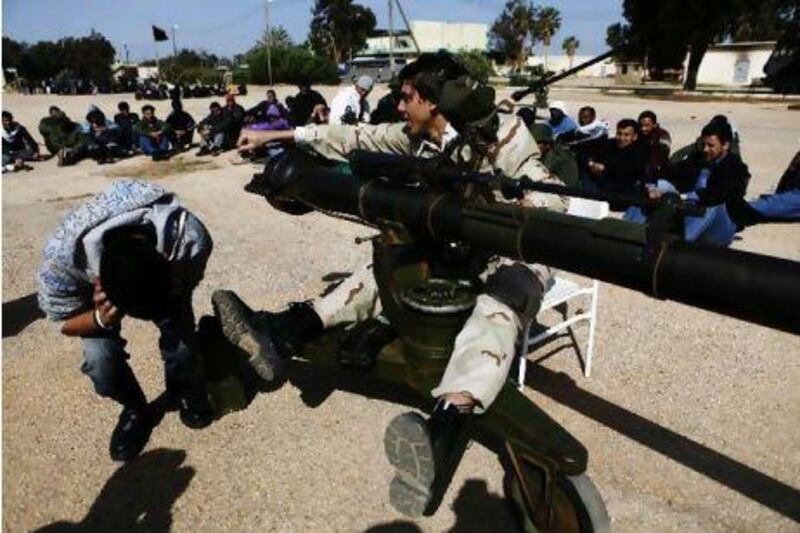BENGHAZI // Just days ago, the fervour of the residents of this seaside city could not be contained.
Freed from the yoke of Muammar Qaddafi and his spies for the first time in decades, Benghazis luxuriated in their new-found freedom, speaking their minds night and day without fear of penalty and imprisonment - or worse.
Now, however, storm clouds are gathering over what may be an all-too-brief political spring in Benghazi. Forces loyal to the Libyan leader are drawing near, and a note of fear has crept into those once irrepressible voices.
Rebels lost control of the oil port of Brega yesterday and government warplanes launched air strikes on the rebel-held town of Ajdabiyah, only 140km south of here. From Ajdabiyah, a highway cuts through the desert directly to Tobruk and the Egyptian border. Within days, Benghazi could be surrounded by pro-Qaddafi forces.
Abdel Fattah Younes, a former minister of interior and now rebel chief of staff, called the retreat a "tactical withdrawal", but the signs of crumbling rebel lines and fraying security are everywhere.
Qaddafi loyalists are re-emerging, and as the enemy closes in from without, the fear of the enemy within casts a lengthening shadow for the rebels and their supporters.
"During the day, there are a lot of people in the streets and we feel secure," said Azzadine al Farjan, a 20-year-old shopkeeper in Benghazi. "But in town there are still some Qaddafi supporters, former members of his revolutionary committees."
"We have a list with their names," boasted Mustafa Gheriani, an opposition spokesman. "We will arrest them."
Despite the creation by the rebels of patrols to police Benghazi's streets at night, violence has escalated.
A cameraman for al Jazeera, Ali Hassan Jaber, a Qatari national, was shot dead on Saturday while driving on the outskirts of Benghazi. Jaber and other members of the al Jazeera television crew were ambushed as they returned to Benghazi city centre after covering a demonstration outside the city.
"It is clearly a targeted attack against the press, in particular against al Jazeera," said Mohammed Sharif, 25, a dentistry student at Benghazi University.
The killing of the al Jazeera journalist was the latest sign that Col Qaddafi's allies in Benghazi have become bolder as his forces close in.
As reports from the battlefield turned grimmer for the rebels last week, unknown assailants tossed a grenade before dawn at a Benghazi hotel popular with foreign journalists, and bomb threats against known rebel gathering places escalated.
By Sunday, rebel-assigned security guards were ubiquitous at hotels, and the courthouse, once a hive of insurgent activity, was silent except for the occasional laughter of a young boy watching cartoons on televison.
Benghazi's nights are now punctuated by the pop and roar of explosions. Their source is a mystery.
"A Molotov cocktail was thrown at my neighbour's house," said Mr Sharif. The targeted family had no political affiliation and had not been active in the rebellion, he said. The attack, like others in Benghazi, appear intended simply to terrorise the population.
"Do not go around after dusk," advised a pro-Qaddafi taxi driver. "There's a lot of armed people roaming around town, trying to rob people."
There appears to be no brake on the slide towards bloodshed and anarchy here. After several weeks of combat, the insurgents still do not look like a cohesive army.
A senior rebel officer at the courthouse acknowledged the disorganisation of their ranks, but added optimistically that arms and more skilled fighters were moving to the front.
"Five days ago, professional army officers and members of the special forces joined the youth, which is now on the second lines of the battle," the officer said.
"Our problem is the regime attacks from the air," he said. "This is why we are asking the international community for a no-fly zone."
For the people of Benghazi, the weapons for the upcoming battle, which appears all but inevitable, are likely to be the arms that were looted from military bases during the start of the uprising last month.
With the aid of local mosque officials, rebel leaders are trying to collect the looted arms to prevent them from falling into the wrong hands and to discourage armed violence. Few here think their campaign will be successful, however.





